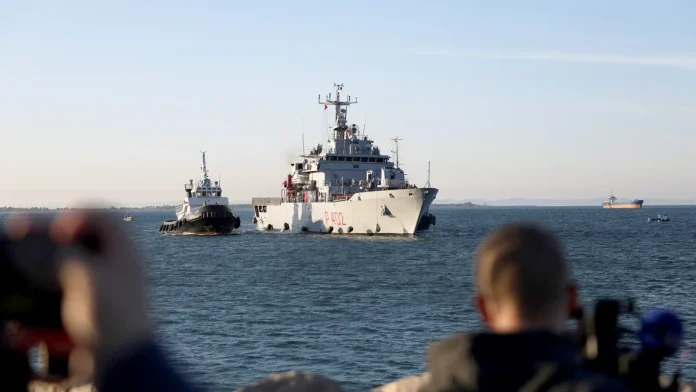An Italian warship Libra docked at the Albanian port of Shengjin to deliver the first group of 16 migrants intercepted in international waters for processing, according to AP News.
The ship left the port of Lampedusa with 16 men on board, 10 from Bangladesh and six from Egypt. They were rescued at sea after leaving Libya.
Last week, Italy officially opened two centres in Albania where it planned to process thousands of asylum seekers beyond its borders. The centres would only house adult men, whereas vulnerable people, such as women, children, the elderly, and sick or torture victims, would be housed in Italy. Families would not be separated.
Italian Ambassador to Albania Fabrizio Bucci stated on Friday that the two centres were ready to receive migrants after the opening was postponed for several months. However, a small group of activists gathered at the harbour entrance to protest the arrival of the migrants.
The number of people arriving in Italy along the central Mediterranean migration route from North Africa fell 61 per cent in 2024 compared to 2023. As of 15 October this year, 54,129 migrants had arrived in Italy by sea, down from 138,947 on the same date last year, according to the Italian Interior Ministry.
Under a five-year agreement signed last November by Italian Prime Minister Giorgia Meloni and her Albanian counterpart Edi Rama, up to 3,000 migrants picked up monthly by the Italian Coast Guard in international waters would be sheltered in Albania. They would first be screened aboard the ships that rescued them and then shipped to Albania for further inspection.
Out-of-box thinking
The two centres will cost Italy 670 million euros ($730 million) over five years. The facilities are run by Italy and under Italian jurisdiction, with external security provided by Albanian guards.
In Albania, migrants retain their right to apply for asylum in Italy and have their applications processed there, in accordance with international and European Union law. The process takes up to 28 days, including any appeal cases.
Italy agreed to welcome those granted asylum. Meanwhile, those whose applications were rejected would face deportation directly from Albania.
The agreement was endorsed by European Commission President Ursula von der Leyen as an example of “out-of-box thinking” in addressing the issue of migration to the European Union. However, human rights organisations criticised the decision as setting a dangerous precedent.
Rama made it clear that no other country would be able to have such centres in Albania. He stated that his country felt grateful for the tens of thousands of Albanians that Italy welcomed after the fall of communism in 1991. Rome also supported Tirana during the economic turmoil in 1997 and after the 2019 earthquake.
